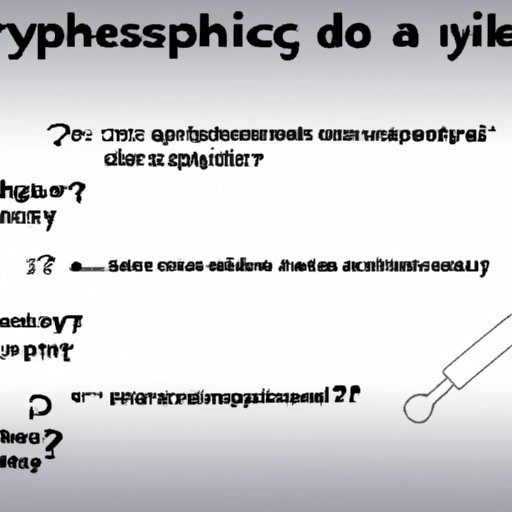Introduction
A hypothesis is an educated guess or prediction about the relationship between two or more variables. It is an essential part of the scientific process, as it helps researchers explore and explain observed phenomena. By formulating hypotheses, scientists are able to determine the cause and effect relationships between variables and make predictions about future events or behaviors. In this article, we will discuss the basics of formulating a hypothesis, including understanding the scientific method, creating an effective research question, and using existing research to inform your hypothesis.

The Basic Elements of a Hypothesis
In order to formulate a hypothesis, you must first identify the variables that you want to explore. Variables are any factors that can change or influence the outcome of an experiment. For example, if you are studying the effects of fertilizer on plant growth, then the variables would be the type of fertilizer used and the amount of growth in the plants.
Once you have identified the variables, you must establish a cause and effect relationship between them. This means that you need to determine how one variable affects the other. For instance, if you are studying the effects of fertilizer on plant growth, then you would need to determine whether the fertilizer causes the plants to grow faster or slower.
Finally, you must make a prediction about the outcome of your experiment. This can be done by using the data from your research to make an educated guess about what will happen when the variables are manipulated. For example, if you are studying the effects of fertilizer on plant growth, then you might predict that the plants will grow faster with more fertilizer.

The Scientific Method and Its Role in Forming Hypotheses
The scientific method is the process that scientists use to test hypotheses and draw conclusions. It involves making observations, asking questions, forming hypotheses, conducting experiments, analyzing data, and drawing conclusions. The scientific method is an important tool for formulating hypotheses because it helps scientists test their ideas and ensure that their results are accurate.
The steps of the scientific method include making observations, asking questions, forming hypotheses, conducting experiments, analyzing data, and drawing conclusions. The first step is to make observations and ask questions about the phenomenon being studied. Then, hypotheses are formulated based on these observations and questions. After that, experiments are conducted to test the hypotheses. Data is collected and analyzed to determine if the hypotheses were correct. Finally, conclusions are drawn based on the results of the experiments.
The scientific method is useful for formulating hypotheses because it helps scientists test their ideas and ensures that their results are accurate. By following the steps of the scientific method, scientists can determine if their hypotheses are valid and reliable. Additionally, the scientific method allows scientists to refine their hypotheses as they gather more evidence and data.

Creating an Effective Research Question
Before you can formulate a hypothesis, you must first create an effective research question. A good research question should be specific, measurable, and testable. Additionally, it should be relevant to the topic you are exploring and provide enough information for you to formulate a hypothesis. Here are some tips for creating an effective research question:
- Be specific – narrow down the scope of your research question so that you can focus on a specific aspect of the topic.
- Make sure it’s measurable – make sure that your research question can be answered with data or evidence.
- Ensure it’s testable – make sure that your research question can be tested with an experiment or other methods of research.
- Be relevant – make sure that your research question is related to the topic you are exploring.
- Provide enough information – make sure that your research question provides enough information for you to formulate a hypothesis.
Here are some examples of good research questions:
- Does fertilizer increase the growth rate of plants?
- What factors influence people’s decision to purchase organic food?
- Do different types of music have an effect on memory recall?
Formulating Hypotheses Based on Existing Research
In addition to creating your own research question, you can also formulate hypotheses based on existing research. To do this, you must first review existing research on the topic you are exploring. This can include reading scientific articles, researching online, or consulting experts. After reviewing the research, analyze the results to determine what patterns or trends emerge.
Once you have identified patterns or trends in the results of existing research, you can use this information to formulate hypotheses. For example, if the results of existing research indicate that fertilizer increases plant growth, then you might formulate a hypothesis that states “fertilizer will increase the growth rate of plants.”
Examples of Good Hypotheses
Here are some examples of successful hypotheses:
- Increasing the amount of fertilizer will increase the growth rate of plants.
- Exposure to loud noises will decrease an individual’s ability to recall information.
- Eating organic foods will improve an individual’s overall health.
These hypotheses are successful because they are specific, measurable, testable, and relevant to the topics being explored. Additionally, they provide enough information for scientists to conduct experiments and draw conclusions.
Conclusion
Formulating a hypothesis is an essential part of the scientific process. It allows scientists to explore and explain observed phenomena and make predictions about future events or behaviors. In order to formulate a successful hypothesis, you must first understand the scientific method and create an effective research question. Additionally, you can use existing research to inform your hypothesis. By following these tips, you will be able to formulate a successful hypothesis.
(Note: Is this article not meeting your expectations? Do you have knowledge or insights to share? Unlock new opportunities and expand your reach by joining our authors team. Click Registration to join us and share your expertise with our readers.)
